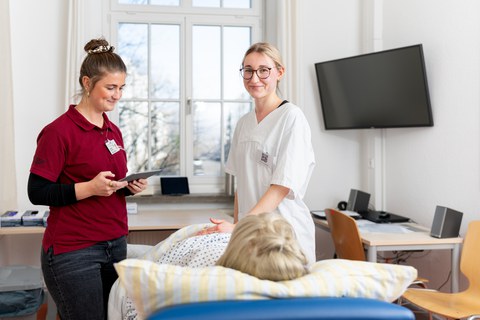Mar 27, 2025
From the lecture hall to the delivery room: The first 17 graduates of the TUD midwifery degree program receive their certificates

Eine Studentin bei einer Prüfung im Fach Hebammenkunde.
On March 27, the first 17 graduates of the Bachelor's degree program in Midwifery at TU Dresden's Faculty of Medicine receive their certificates. Like their entire degree program, this is a first. In October 2021, they were the first cohort at the newly founded Center for Midwifery Education (ZHW) to begin academic training at TU Dresden to become midwives. Meanwhile, there are almost 60 of these dual degree programs in Germany. In Saxony, young women – and, of course, men – can pursue a corresponding academic program in Dresden and Leipzig.
Where is the best place to give birth to my child? How can I manage the birth well? What awaits us when we become a young family? Is this examination really necessary? What would you do in my situation? Midwives must be able to provide expert answers to these and similar questions. They are often the first point of contact for pregnant women and need a resilient foundation to enable them to act professionally.
“Both the ongoing refinement of prenatal diagnostics and the growing number of pregnant women affected by chronic conditions such as obesity, diabetes mellitus and cardiovascular diseases are placing greater demands on midwives. Interprofessional collaboration, psychological support and the ability to respond to complex medical needs are essential to meeting these demands,” says Prof. Pauline Wimberger, Dean of Studies and Director of the Department of Gynecology and Obstetrics at the University Hospital Dresden. As experts in all medical and psychosocial aspects associated with pregnancy, childbirth and the postpartum period, midwives play a pivotal role in preventive healthcare for women and families. The academization of the midwifery profession, with the proviso of an education that is both evidence-based and practice-oriented, was therefore a logical step, which Germany, in comparison to other European countries, took relatively late when it amended the law in 2019.
In response to the new legislation, a group of midwives, professors and obstetrician-physicians at the newly established Center for Midwifery Education (ZHW) at TU Dresden's Faculty of Medicine designed the new degree program. The program runs for seven semesters and students acquire both scientific knowledge and methodological skills. It also facilitates interdisciplinary exchange to help break down prejudices.
“During their studies, prospective midwives acquire knowledge in anatomy, neonatal and infant development, gynecology, psychology, and professional ethical framework conditions. They can also specialize further by choosing from two elective compulsory modules,” explains Dr. Katharina Langton, who has been co-director of the degree program at the ZHW with Dr. Friederike Seifert since 2021. The two directors complement each other with their many years of experience in midwifery, science and education.
Students deepen their knowledge from lectures, seminars and tutorials through placements, excursions and practical exercises in a specially designed practice delivery room, the Skills Lab. Here, students can test their knowledge and practice crisis situations in a protected environment using simulation models. During their practical placements in one of the by now 15 partner hospitals, they apply what they have learned under the supervision of mentors.
“In Katharina Langton and Friederike Seifert, we have been able to secure two excellent directors of the center, who, along with Pauline Wimberger and the team of midwifery experts, have succeeded in establishing a high-quality degree program for midwives. The strong demand and low dropout rate are testament to this,“ says Prof. Esther Troost, Dean of the Faculty of Medicine.
“The University Hospital Dresden covers the field of birth and delivery from different perspectives, from the desire to have children to the support of high-risk pregnancies. Therefore, we depend on well-trained midwives. We are pleased that the first class is now able to complete their studies. The feedback from the wards was very positive. Thanks to the numerous practical placements, we have been able to dispel reservations about academic training. The mentors appreciate the students' extensive specialist knowledge,” explains Prof. Uwe Platzbecker, Medical Director of the University Hospital Dresden.
Background information:
- Admission requirements: general university entrance qualification or specific completed trainings, internships
- Dual degree, 30 slots
- 7 semesters
- Payment through employment with participating partners (integrated into the shift system: early, late and night shifts)
- Participating partners throughout Saxony – with a focus on Eastern Saxony / shared with Leipzig (which also offers a degree program in midwifery)
Further links:
- Center for Midwifery Education: https://tu-dresden.de/med/mf/zhw
- Degree: https://tu-dresden.de/med/mf/zhw/studium
- Vlog: https://tu-dresden.de/med/mf/zhw/das-zentrum/news/vom-hoersaal-in-den-kreisssaal-studi-vlog-zum-bachelor-hebammenkunde
Contact:
Dr. Katharina Langton
Academic Director of the Midwifery B.Sc. program
Center for Midwifery Education
Dr. Friederike Seifert
Educational Director of the Midwifery B.Sc. program
Center for Midwifery Education
